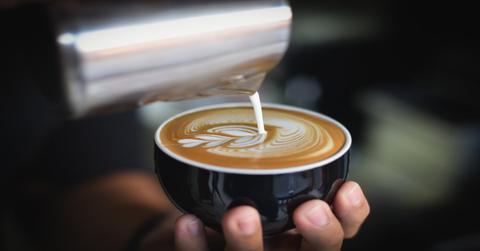PSA: Your Coffee Habit Might Be Aging You Prematurely
Without a doubt, there are a lot of health benefits that come along with drinking a cup or two of coffee. Research shows that safe caffeine consumption via your favorite piping hot mug can help in more ways than you'd expect.
Updated May 22 2019, 7:07 a.m. ET
Without a doubt, there are a lot of health benefits that come along with drinking a cup or two of coffee. Research shows that safe caffeine consumption via your favorite piping hot mug can help with mental clarity, improve your memory, and even lower your risk of Alzheimer's. Not to mention that studies have proven that drinking coffee may lower your risk of depression and minimize your chances of developing Type 2 diabetes. Of course, as we know all too well, nothing is entirely perfect, and sadly, coffee is no exception.
A steady caffeine habit definitely comes with some drawbacks. First of all, it can lead to caffeine addiction, which happens for a few reasons. First of all, caffeine is a stimulant that affects your central nervous system. If you drink too much of it, you can develop a higher tolerance to caffeine, meaning that you'll progressively need more and more of the good stuff to keep your energy levels up. Drinking too much coffee can also increase your anxiety, damage your bones, and even elevate your blood pressure.
But one under-discussed way coffee can impact your health is majorly concerning: It can cause you to look older than you actually are.
That's right: Our beloved morning cup of Joe might be doing more damage to our complexions than we'd like to think. Here's the science behind this claim: First of all, coffee is a diuretic. Basically, this means that when we drink coffee in excess, we're dehydrating our bodies. Unlike drinking a glass of water, for example, coffee isn't replenishing our systems. Now, here's where it impacts our skin: The more we drink coffee, the more our skin loses moisture. And what tends to happen when our skin loses its natural moisture? It looks less healthy and loses its shine and glow. Dehydration in general can also lead to collagen loss and skin inflammation.
Now, this insight comes with an important disclaimer: There is no wrong or right way for anyone's skin to look, and beauty is definitely subjective. What someone might seen as a sign of looking "old," such as wrinkles, another person might see as a beauty trait. As our society expands its definitions of beauty and becomes more inclusive and welcoming, it's good to question beauty ideals and standards, including expectations about looking a certain age.
That said, you might still be wondering: Is there anything I can do to counteract the affects of my coffee? Thankfully, we have some simple ways to remedy coffee's dehydrating qualities.
First, drink coffee in moderation. I know, I know; it's tough! According to the Mayo Clinic, the average, healthy adult can consume up to 400 milligrams of caffeine per day. In terms of coffee, that's equal to roughly four cups. Beyond this, it's important to stay hydrated with actual water. The standard recommendation is that you consume eight eight-ounce glasses of water per day, which translates to roughly 2 liters. But it's also good to remember that many foods are great sources of water, as well as drinks like teas or juices.
So, in short, if you're worried about your coffee intake, it's always a fair idea to taper down and integrate more water in your day. If you're worried about your skin and dehydration, build water back into your rotation, and remember: Staying hydrated benefits your entire body, not just your face. Because who is more valuable than you?
